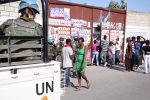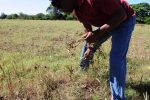Haiti Support Group Post-Earthquake Priorities
At 4.53pm on January 12th 2010, the earth shook violently in and around the overcrowded city of Port-au-Prince, Haiti’s capital. The death toll, destruction and destitution caused in in just seconds were well chronicled — for about ten days — by the international media.
There was no definitive death toll, but we do know that between 230,000 and 305,000 people died. Some 4,100 of those who survived had to have emergency amputations — often in horrendous conditions. At least 1.5 million people were made homeless.
Just as the media failed to analyse the social, economic and political conditions that played such a role in making the Haitian earthquake the most deadly natural disaster this century, the press are no longer there to tell you the the inspiring tale of how Haitians are responding. WE DID.
For over 30 years, we have been amplifying the voices of Haitian grassroots organisations through lobbying, campaigning and advocating. In doing so, the Haiti Support Group (HSG) plays a vital role in educating politicians, press and public in Europe and North America. Never has this role been so vital.
Despite what you may have read about the UN, the Red Cross, international NGOs or Bill Clinton (the UN Secretary General’s Special Envoy to Haiti), it is Haitians, not foreigners, who are playing the lead role in the reconstruction of Haiti.
As numerous donor bodies try (or often don’t) to co-ordinate a reconstruction and redevelopment program, it is Haitians working as rubble clearers, builders, flood prevention engineers, health promotors, sanitation workers and teachers who are forging their own vision of a new Haiti.
We believe that an evolving and expanding grassroots vision needs to replace the flawed development model that singularly failed the vast majority of Haitians in the three decades preceding the earthquake. That failed template — an urban, centralised, factory-assembly plant model — accounts for much of the massive death toll in the earthquake.
We have rededicated ourselves to amplifying the voices of ordinary Haitians demanding a real say in the development models now being forged by others for their country. We have launched campaigns (eg on forced evictions of the internally displaced (please see our Campaigns and Advocacy section) and are lobbying in Brussels for better use of EU aid, e.g. to build more food sovereignty.
All such efforts need YOU more than ever. We have some secured some external funding. But this is always temporary, whereas the need to speak up for equitable development policies, human rights, genuine participatory democracy and the ordinary Haitians who advocate them but are usually ignored, is a long-term effort.
In the meantime as Haitians say: Le ou bezwen, se ou k’ pou mache — When it’s you in need, it’s you who must take the first step. Haitians have indeed taken the first step post- earthquake but, as this website makes clear, they face massive obstacles. Accompany them, and us, on a journey that will be as challenging as the remotest Haitian mountain road. Please join the Haiti Support Group now.
'Natural' Disasters in Haiti and the 2010 Earthquake

Tropical Storm Isaac Sparks Cholera Fears
Tropical Storm Isaac Sparks Cholera Fears 16 September 2012, by Jacqueline Charles, The Miami Herald. Original article The panic began to set

400,000 Haitians Still displaced
400,000 Haitians Still displaced. By Mariana Rebua Simoes, MediaGlobal News September 7, 2012 mediaglobal Nicole Phillips, attorney at the NGO

Pride and Palaces
Pride and Palaces. Sept. 14 2012, The Economist online Left half in ruin for almost three years, Haiti’s National Palace

Haiti Third in Global Hunger Index
Haiti Third in Global Hunger Index. October 11, 2012 The latest report, out today, reveals Haiti’s situation with respect to hunger

One-Month State of Emergency Due to Impact of Hurricane
November 1, 2012, Caribbean Journal
(original article here)
Haiti’s government has declared a one-month-long national state of emergency following continued damage to the country from Hurricane Sandy last week.

Already Desperate. Haitian Farmers Left Hopeless After Storm
Already Desperate. Haitian Farmers Left Hopeless After Storm, November 18, 2012. RANDAL C. ARCHIBOLD / The New York Times. Original

Reconstructing Haiti at the Frontline Club
HSG’s Mario Gousse and Andy Leak were invited by the Frontline Club to speak at an event entitled “Reconstructing Haiti”.

Haiti’s rising food insecurity risks social tension, says FAO
Haiti’s rising food insecurity risks social tension, says FAO. November 22, 2012 (Reuters). Original article here (Rome) Growing food insecurity

Evidence grows that peacekeepers were source of infection
Government to unveil 10-year plan for water and sanitisation as evidence grows that peacekeepers were source of infection November 29,2012

